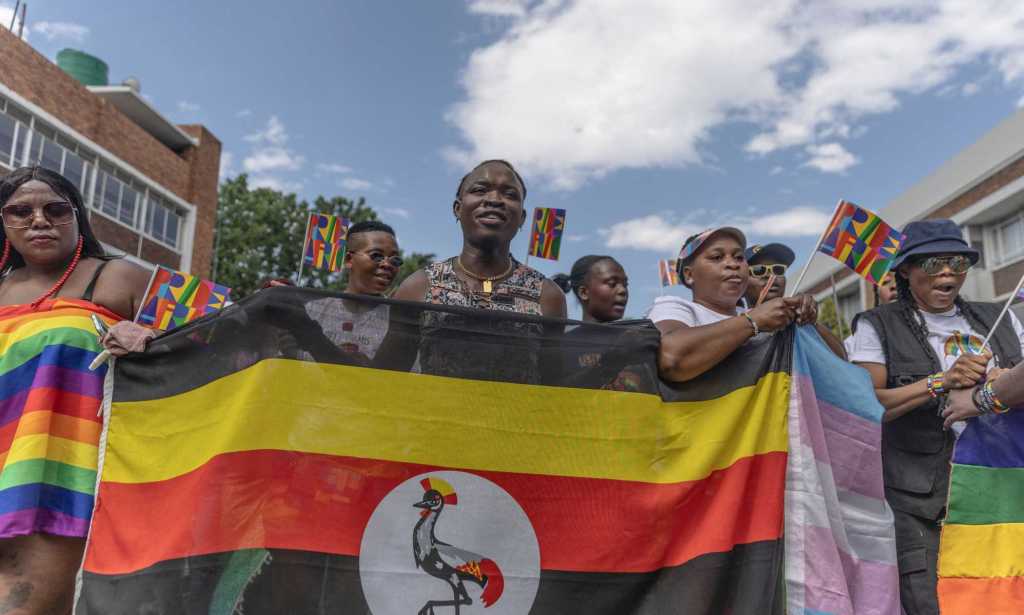Uganda accuses US of trying to impose ‘LGBT agenda’ with new sanctions
Sign up for more LGBTQ+ news and updates at TrueQueer.
In a recent development, Uganda has condemned the United States and accused them of trying to push an “LGBT agenda” in Africa after Washington announced new sanctions against Ugandan officials. The US confirmed on Monday (4 December) that they would expand visa restrictions on Ugandan officials that it deems responsible for repressing several marginalized groups, including the LGBTQ+ community, with the controversial anti-LGBTQ+ law introduced this year.
Uganda’s president signed an Anti-Homosexuality Bill into law earlier this year, which criminalizes anyone in the country who identifies as LGBTQ+. Those who identify as queer could face up to 20 years in prison, while those found guilty of “aggravated homosexuality” under the act could face punishment as harsh as the death penalty. Already, the law has seen a notable spike in homophobic abuse and a number of arrests.
Announcing the visa restrictions on Monday, US Secretary of State Antony Blinken said, “Today, I am announcing the expansion of the visa restriction policy to include current or former Ugandan officials or others who are believed to be responsible for, or complicit in, undermining the democratic process in Uganda or for policies or actions aimed at repressing members of marginalized or vulnerable populations. These groups include, but are not limited to, environmental activists, human rights defenders, journalists, LGBTQI+ persons, and civil society organizers.”
The move comes after President Joe Biden announced in October that he planned to end the US relationship with Uganda and several other African countries over what he described as “gross violations” of human rights. In response, Uganda’s State Minister for Foreign Affairs, Henry Okello Oryem, has criticized the US and vowed that his government will not yield to the country’s “LGBT agenda.”
“There’s a coup at the State Department in the U.S. It is being taken over by people who are pushing the LGBT agenda in Africa,” said Oryem, per Reuters. “Why don’t they impose the same sanctions on the Middle Eastern countries which have the same or harsher laws against LGBT? If they deny our MPs visas they will [go] to Shanghai, Guangzhou. There are very many beautiful places to visit.”
These visa restrictions are just the latest response to Uganda’s Anti-Homosexuality Bill. A primary round of visa restrictions on Ugandan officials was issued by the US back in June. In August, the World Bank cut off all new lending to the African country because its controversial law “fundamentally contradicts the World Bank Group’s values.”
The US government’s decision to impose these sanctions raises important questions about the efficacy and morality of such actions. While critics argue that the US is interfering with Uganda’s sovereignty and imposing its own cultural beliefs, proponents of the sanctions argue that they are necessary to address gross human rights violations and protect marginalized communities.
However, it is essential to note that Uganda is not the only country in Africa with anti-LGBTQ+ laws. Several other nations on the continent have similar or even harsher legislation in place. Thus, the accusation that the US is specifically targeting Uganda while ignoring other countries with comparable laws raises concerns about selective enforcement.
Moreover, the argument that these sanctions are part of an “LGBT agenda” overlooks the core issue at hand – the violation of human rights and the persecution of marginalized communities. The focus should be on protecting the rights and well-being of all individuals, regardless of their sexual orientation or gender identity, rather than engaging in political rhetoric.
In conclusion, the accusations made by Uganda against the United States regarding the imposition of an “LGBT agenda” through new sanctions raise important questions about the motivations behind these actions. While it is crucial to address human rights violations and protect marginalized communities, it is equally important to ensure that these actions are consistent and not selectively enforced. The international community must continue to advocate for inclusivity, equality, and the protection of human rights for all individuals, irrespective of their sexual orientation or gender identity.
Follow us on: Facebook for more LGBTQ+ news and updates at TrueQueer.
![]()

